The Fourth World War is a american film of genre Documentary released in USA on 27 april 2003
The Fourth World War (2003)
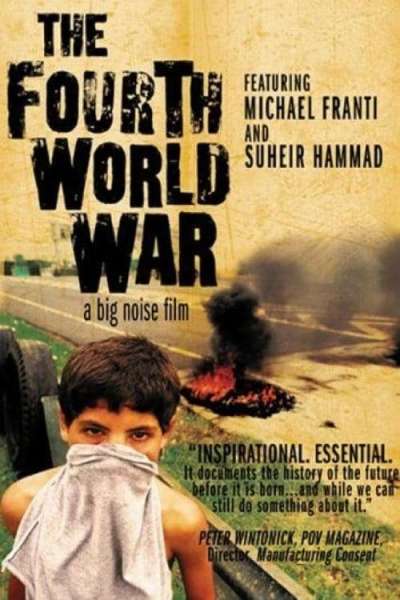
If you like this film, let us know!
- Infos
- Casting
- Technical infos
- Photos
- Videos
- Film quotes
- Characters
- Music
- Awards
Released in USA 27 april 2003
Length 1h18
OriginUSA
Genres Documentary
Themes Films about anarchism, Politique, Documentary films about war, Documentary films about historical events, Documentary films about politics, Documentary films about anarchism, Political films
Rating69%










The Fourth World War is a 2003 feature film directed by Rick Rowley.
Synopsis
Tourné sur cinq continents durant plus de deux ans, The Fourth World War fait l’inventaire des nombreux mouvements citoyens qui ont pris naissance un peu partout sur la planète, comme pour écrire une nouvelle page d’histoire composée d’actes de résistance au néo-libéralisme. Filmé simultanément aux premières lignes des conflits au Mexique, en Argentine, en Afrique du Sud, en Palestine, en Corée, en Afghanistan et en Irak, mais aussi lors des grands rassemblements de Seattle, de Gênes et de Québec, ce film engagé témoigne des luttes que mènent des hommes et des femmes contre l’oppression, l’injustice et la violence qui leur sont imposées. The Fourth World War traite de cette guerre sournoise que les États, en concomitance avec les grands groupes financiers et industriels, livrent contre les intérêts et les besoins des citoyens du monde.Comments
Leave comment :
Suggestions of similar film to The Fourth World War
There are 8969 with the same cinematographic genres, 8258 films with the same themes (including 1 films with the same 7 themes than The Fourth World War), to have finally 70 suggestions of similar films.If you liked The Fourth World War, you will probably like those similar films :

To Die in Madrid (1963)
, 1h25Origin France
Genres Documentary
Themes Films about anarchism, Politique, Documentary films about war, Documentary films about historical events, Documentary films about politics, Documentary films about anarchism, Political films
Actors John Gielgud, Irene Worth, Suzanne Flon, Germaine Montero, Pierre Vaneck, Jean Vilar
Rating79%





1936. Une guerre civile éclate en Espagne. Durant quatre années, Républicains et Nationalistes s'affrontent jusqu'à la dictature franquiste.
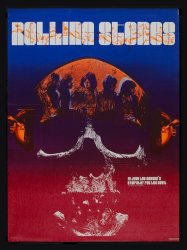
Sympathy for the Devil (1968)
, 1h50Directed by Jean-Luc Godard
Genres Documentary, Musical
Themes Films about anarchism, Films about music and musicians, Politique, Documentary films about music and musicians, Documentary films about politics, Documentary films about anarchism, Musical films, Political films
Actors Mick Jagger, Marianne Faithfull, Anne Wiazemsky, Iain Quarrier, Jean-Luc Godard, James Fox
Rating62%





Composing the film's main narrative thread are several long, uninterrupted shots of The Rolling Stones in a sound studio, recording and rerecording various parts to "Sympathy for the Devil." The dissolution of Stone Brian Jones is vividly portrayed, and the chaos of 1968 is made clear when a line referring to the killing of John F. Kennedy is heard changed to the plural after the assassination of Robert F. Kennedy in June.

Hearts and Minds (2006)
, 1h52Directed by Peter Davis
Origin USA
Genres War, Documentary
Themes Politique, Documentary films about war, Documentary films about historical events, Documentary films about politics, Political films
Actors Bob Hope
Rating81%





Un documentaire soulignant, à travers des images d'archives et des témoignages, les enjeux et les attitudes contradictoires des témoins de la guerre du Viêtnam. Le titre vient directement d'un discours du président Lyndon Johnson qui déclara, en tentant de justifier l'envoi de soldats au Viêtnam, que l'ultime victoire ne se gagnerait qu'avec le cœur et l'esprit des hommes qui vivent là-bas.
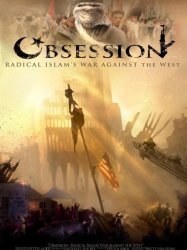
Directed by Raphael Shore
Origin USA
Genres Documentary
Themes Politique, Films about religion, Films about terrorism, Documentary films about law, Documentary films about war, Documentary films about historical events, Documentary films about politics, Documentary films about religion, Documentary films about terrorism, Political films, Films about Islam
Rating64%





The movie begins with the following statement: This is a film about radical Islamic terror. A dangerous ideology, fueled by religious hatred. It's important to remember most Muslims are peaceful and do not support terror. This is not a film about them. This is a film about a radical worldview, and the threat it poses to us all, Muslim and non-Muslim alike. The film uses many images from Arab TV, provided by the Middle East Media Research Institute and Palestinian Media Watch.
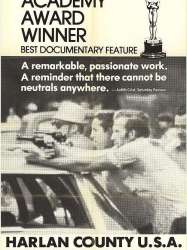
Harlan County U.S.A. (1977)
, 1h43Directed by Barbara Kopple
Origin USA
Genres Documentary
Themes Environmental films, Films about anarchism, Politique, Films about the labor movement, Documentary films about business, Documentary films about environmental issues, Documentary films about politics, Documentary films about technology, Documentary films about anarchism, Political films
Rating81%





Kopple initially intended to make a film about Kenzie, Miners for Democracy and the attempt to unseat Tony Boyle. When miners at the Brookside Mine in Harlan County, Kentucky went on strike in June 1972, Kopple went there to film the strike against Duke Power Company which the UMWA had helped to organize. The strike proved a more interesting subject, so Kopple switched the focus of her film.
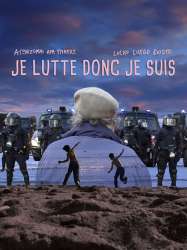
I Fight, Therefore I Am (2015)
, 1h28Origin France
Genres Documentary
Themes Films about anarchism, La mondialisation, Politique, Documentary films about politics, Documentary films about anarchism, Political films
Rating72%





En Grèce et en Espagne, le film fait un tour d'horizon des luttes qui soufflent en Europe contre la résignation et les politiques d'austérité. Il s'agit d'un voyage en musique, d’un bout à l’autre de la Méditerranée, à la rencontre de résistances, de terres en luttes et d’utopie.
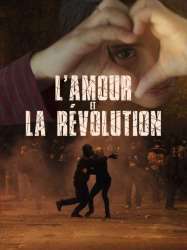
Love and Revolution (2018)
, 1h17Origin France
Genres Documentary
Themes Films about anarchism, La mondialisation, Politique, Documentary films about politics, Documentary films about anarchism, Political films
Rating21%





« Dix ans après les premières émeutes, les médias européens prétendent que la cure d’austérité en Grèce a réussi et que le calme est revenu. Ce film prouve le contraire. À Thessalonique, des jeunes empêchent les ventes aux enchères de maisons saisies. En Crète, des paysans s’opposent à la construction d’un nouvel aéroport. À Athènes, un groupe mystérieux inquiète le pouvoir en multipliant les sabotages. Dans le quartier d’Exarcheia, menacé d’évacuation, le cœur de la résistance accueille les réfugiés dans l’autogestion. Un voyage en musique parmi celles et ceux qui rêvent d’amour et de révolution.

Hitler's Reign of Terror (1934)
, 55minutesOrigin USA
Genres Drama, Documentary
Themes Politique, Documentary films about war, Documentary films about historical events, Documentaire sur une personnalité, Documentary films about politics, Hitler, Political films, Documentary films about World War II
Rating52%





As the picture opens, a re-enacted phone call featuring reporter Cornelius Vanderbilt, Jr. in Germany, and narrator Edwin C. Hill in New York is depicted. Then a parade of people carrying torchlights in Berlin, where Jewish works and other political books are burned. Vanderbilt meets with Hill, and then flies out of the country. Hill talks with Vanderbilt about the problems in his country, then a re-enacted interview between Adolf Hitler and Vanderbilt. During a viewing of World War I battle footage, Hitler's home town, Leonidad, Austria, and his parents' graves are pictured. Vanderbilt goes to Vienna, to see Chancellor Dollfuss, and he films several Austrian Nazi riots during a parade. In a re-enactment, Vanderbilt's passport is stolen, and there are several shots of Nazis abusing Jews. In yet another re-enactment, Vanderbilt interviews Crown Prince Wilhelm, and more books are burned. Helen Keller talks to an interviewer about her books, which were burned by the Nazis. Then a conversation Vanderbilt, Kaiser Wilhelm II in Doorn, Holland, and Prince Louis Ferdinand had is re-enacted. Actual anti-Nazi speeches given by prominent Jews and some Gentiles are shown and the Nazis are shown trying to alter the Bible. In the final scene, Congressman Samuel Dickstein of New York and Hill give speeches directly to the audience, explaining the dangers of Nazism.
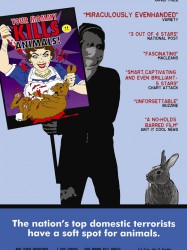
Your Mommy Kills Animals (2007)
, 1h45Origin USA
Genres Documentary
Themes Films about animals, Environmental films, Politique, Films about terrorism, Documentary films about animal rights, Documentaire animalier, Documentary films about law, Documentary films about environmental issues, Documentary films about war, Documentary films about historical events, Documentary films about politics, Documentary films about terrorism, Political films, Documentary films about nature
Rating65%





The film reports on controversies concerning and within the animal rights movement. These include external conflicts between animal rights advocates and medical researchers and restaurant operators, and internal disagreements within the animal rights movement between the animal shelter operators and the confrontationalists who demonstrate outside homes of corporate opponents. The film also discusses the comparison between animal liberation activists and political terrorists, including the FBI's ranking of animal-rights activists as the nation's No. 1 domestic terrorism threat.
 , 1h30
, 1h30Origin USA
Genres Documentary
Themes Films set in Africa, Politique, Films about religion, Documentary films about law, Documentary films about war, Documentary films about historical events, Documentaire sur une personnalité, Documentary films about politics, Documentary films about religion, Political films, Films about Jews and Judaism
Rating80%





 Connection
Connection